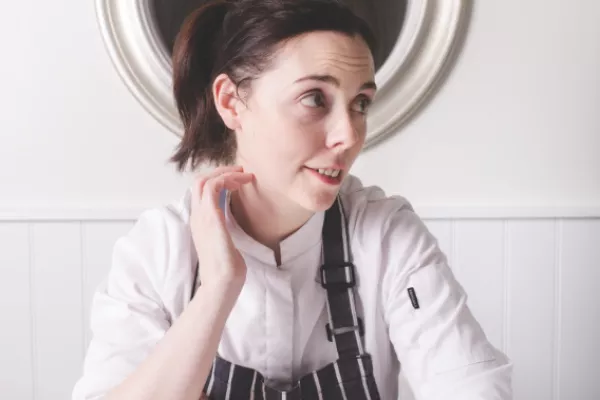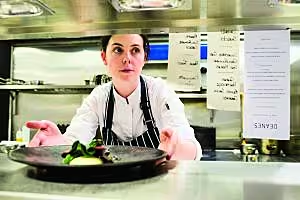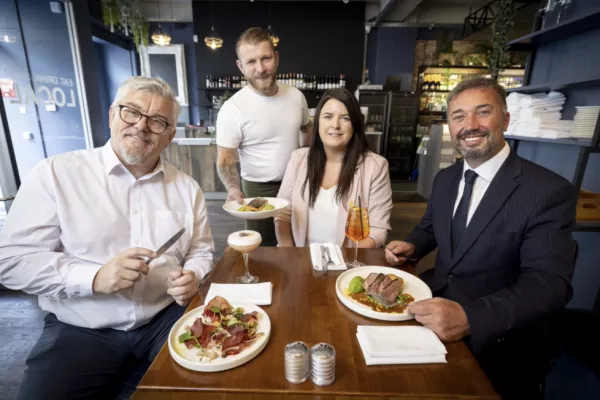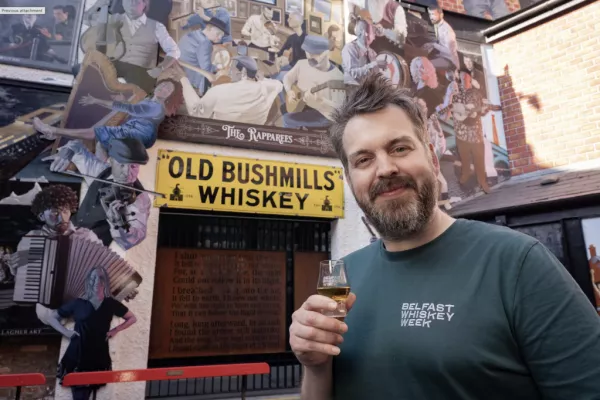Danni Barry, Ireland’s only female Michelin-starred chef, recently visited Dublin, where she sat down with Andrew Jennings to discuss how she got her start in cooking, what it is like to work for leading Belfast restaurateur Michael Deane, and whether it has become easier for women to make it to the very top of the cheffing game.
****************************************************************************************************************
It has been said that success comes from taking the initiative, being brave, persisting.
These particular virtues are what initially propelled Ireland’s only female Michelin-starred chef, Danni Barry, from a 14-year-old schoolkid washing dishes in a local restaurant in her spare time to one of the most talented and respected head chefs in the land.
It was Barry’s enterprise as an ambitious 18-year-old, fresh from catering college in Newry, that set her on the path to the very top of the cooking profession. “I just phoned up the restaurant, and they said to come in,” explains Barry, about the day she doorstepped Michael Deane – the doyen of Belfast’s food scene – for a job.
“To be honest, I was terrified. I’m sure the other chefs in his kitchen at the time were probably saying, ‘Ah, sure, she’ll never last – I give her a week.’ But last she did. In fact, Barry’s career has come full circle. Following four years under Deane’s tutelage, she set off to continue her culinary education abroad, taking in the rest of Europe, South Africa, Australia and New Zealand, and garnering knowledge from her experiences in the high-end restaurants in which she worked along the way.
This included working under Simon Rogan, at his L’Enclume restaurant, in Cumbria – now the number-one restaurant in the UK – and as head chef at Rogan & Co., in Cartmel.
When Barry eventually landed back in Belfast, just over three years ago, Michael Deane was only too happy to take his protégée back under his wing. This time, however, it was to lead the kitchen of his latest fine-dining venture, EIPIC, as head chef. EIPIC is the grandest restaurant in the Deane stable, which includes Deanes Meat Locker, Deanes Love Fish, Deanes Deli Bistro & Vin Café, Deanes at Queens and Deane & Decano.
Last year proved a stellar one for both Barry and EIPIC. In the autumn, the restaurant retained its coveted Michelin star for the second year (Deane has held on to his star for 14 consecutive years now), while the 31-year-old from Mayobridge, in County Down, also beat a host of top chefs to claim Irish Chef of the Year at the Food & Wine Restaurant of the Year Awards.
Ulster Restaurant of the Year also went to Deanes EIPIC, with the hat-trick completed by Deane going home with Entrepreneur of the Year, for several decades of handiwork in trying to establish and promote Belfast’s dining scene. Barry describes the 18 months since EIPIC opened as “unreal”, but adds that her upbringing on a rural country farm means that she is never likely to let it go to her head.
“My family at home keep me grounded,” she says. “They are hugely proud. My old schoolteachers will stop my parents in Mayobridge and say, ‘Aye, that’s your wee girl I’m reading about in The Irish Times,’ so it is lovely for them. However, becoming the first female chef in Northern Ireland to get a star is really just part of history now. I will always have that, but I still have my day-to-day job to do, and it’s still hard work. It is not the case that when you get a star, it suddenly becomes all glamorous, with constant interviews and TV appearances. You still have to go in there every day, check the produce, get everything ready for service, keep the kitchen clean. Your job is always going to be your job, and, much like other jobs, it can often be quite monotonous. There are things you need to do every day, even in a Michelin-star restaurant.”
Barry believes that maintaining a level of consistency in the food being served is paramount to maintaining EIPIC’s rigorously high standards.
“It’s because consistency is so important that you do have to do a lot of the same things over and over. I often think that it might be nice to come in and say, ‘Oh, we have a star. Let’s do some mad thing today,’ but it doesn’t work like that. What we’ve to think about is, ‘Right, how many have we in for lunch? Someone has called in sick. Is the produce all in on time?’”
RURAL BACKGROUND
Barry began her kitchen career washing pots while still at school – purely, she maintains, to save to buy her first car.
“I had no real interest in the industry before I started in it. It was just a job. I started peeling potatoes and washing salads, but the head chef sort of brought me on. He could see I was interested, even if I was doing very basic things at the time. I guess, starting in the kitchen at 14 or 15 and having to work weekends and long hours, I sort of got used to it. Perhaps if I had been 18 or 19 when I started, I might have wanted those weekends off for going out.”
Since getting her start in the kitchen, Barry has seldom been afraid of putting her shoulder to the wheel, putting in the hard graft of the long hours associated with professional cooking. Rising early, at 7am, to get the workday started by going foraging or meeting her suppliers, and knowing that service at EIPIC might not finish until 11pm, is a sign of dedication and passion for her chosen craft. Barry is a woman brimming with passion for what she does for a living.
“The hours are really hard for anybody who does not work in the industry to understand,” she concedes. “When you are in the industry, it becomes like you are part of a gang, a community, and everybody understands how things go. It is just different. You’ll work beside people in the kitchen all week long, and you’ll get to know things about them that you probably shouldn’t. You’ll probably know more about their lives than their girlfriend or boyfriend. Then that person may leave, move on, and then it’s like you’ve never met. There can be very intense relationships you build in the kitchen, but they’re also very transitional.”
Every restaurant owner or head chef in the country will tell you that they don’t expect their staff to work long hours, but does Barry feel this is realistic in a profession notorious for working chefs right to the bone? Does she think only the people who put in the long hours will make it to the very top of the profession?
“I think so. Yes. The way we do it [at EIPIC] is if I have to do a four- or four-and-half-day week – and they’re long days – I’ll have a Sunday where I can just switch off. “If you put in the dedication on the days you are supposed to be in there, that’s vital, but until you have more able people to pick from, with a larger skill set, you’re going to have to work splits, which puts a lot of pressure on the guys who are really good, you know, if they’re carrying people who are not so good.
“Sometimes it gets to the stage where someone won’t take days off because they don’t want so-and-so doing their section. They’d rather just come in and do it themselves.”
PASSION
So, does Barry think the word passion is overused by people involved in food?
“Yes, of course,” she says. “You have things like MasterChef, where they say things like, ‘Oh, I have a huge passion for food,’ and they’re probably a graphic designer by trade. They may love food, but they don’t actually want to be a chef. They don’t really understand what it is really about, where you don’t actually mind working from 7am to midnight.
“I guess, in a way, it is a passion for punishment, like a vocation. For some, it is, and for others, it is not. If there weren’t people out there driving standards, getting stars, trying to get to that high level – people making the industry better – then we wouldn’t survive in it. I’m talking about people like Derry Clarke and Ross Lewis – chefs that will leave behind a legacy. That’s what I think passion is.
“All the young people coming through these guys’ kitchens have become the young guns setting up all the new restaurants around Dublin and elsewhere. I think it’s important that young chefs know that these people didn’t just come from nowhere overnight. They came through the top kitchens that have been in operation a long time, setting standards.”
Barry says that she would find it difficult to do what her boss, Michael Deane, does – running, more or less, a restaurant empire in Belfast. She reveals that she’s hugely happy to be working at EIPIC for the foreseeable future, but adds that, eventually, she would like to open a restaurant of her own.
“I couldn’t do what Michael does. I’d like just the one restaurant at some point down the line. I’d love to do something like Ballymaloe in Cork, where it is a collaborative thing, where people come and teach, cook and eat, and maybe have a farm as part of it. Something like that could be your life. I don’t think I want to be in the restaurant trade forever.”
FEMALE CHEFS
Despite the long, unsociable hours, Barry believes that any young chef who is completely sure that it is the industry in which s/he wants to work should really go for it, for as long as possible, while s/he is young, and with few responsibilities, no matter what his/her gender.
“If you are sure it is the industry you want to be in, and you are young, with not many responsibilities, my advice would be to work as hard as possible. Work the long hours, if needed, while you have the chance. Then, when you get to the stage where you do want to have a family – OK, you might not be able to be a head chef, but there will be other avenues to do other things in cooking, and with that experience behind you, you will be able to make it possible. But if you go job to job, with your heart not in it, you’ll fall out of the industry pretty quickly.” Barry adds that young female chefs should ignore it when people say, ‘Oh, well. The industry is not really for girls.’
“I was at the Athrú conference in Galway last year, and I heard some stories from female chefs that really surprised me. Girls were telling me how hard it is for them, working in kitchens where they get called this and that by their male counterparts. Thankfully, it has never happened to me, but I have seen that bullying culture in certain places. Thankfully, I think it is definitely something that is on the wane. I don’t know how anybody would get away with it now because of social media. It would only take someone a couple of seconds to video that in a restaurant on their phone and put it up online. The place would be totally ruined, and rightly so, because it’s no way to treat people.
“What we see now are a lot more open-wall kitchens, where it’s more collaborative, and not the same male hierarchy any more. There are more opportunities for women to run kitchens than ever before.”
Like any intense working environment, the kitchen remains a place where young chefs are thrown in at the deep end, to either sink or swim. For Michelin-starred head chefs like Barry, it can be something of a chore to train a new recruit while also running her kitchen.
“It’s a difficult act to juggle, all right. That’s why any new chef’s enthusiasm is going to play a big part. If you’ve got a young chef coming in and they expect you to take the time to show them everything in detail numerous times and are already asking what time it is they can clock off, then that’s not really going to encourage me to mentor them. I want them to be there, wanting to learn and valuing my time. What we do is, they’ll be shown something once, supervised, then, by the third time, you should be able to do it alone.”
Barry also finds it a mystery why young chefs are not training in some of the finer arts of cooking preparation.
“I wonder why the catering colleges don’t teach students in things like butchery, where they might get some of the top butchers in the country into the classroom to talk and give practical guidance. It’s sad to see that butchers are disappearing. I’d love to see the skill of proper butchery come back.”
Given how highly he rates Barry, is it likely that she is in line to become the heir to Michael Deane’s restaurant throne?
“Well, Michael isn’t exactly stepping back or anything. He has a big workload, but still manages to get behind the stove from time to time. I don’t know. Perhaps it might be a conversation at some stage. Who knows?
“I’ve no plans to leave anytime soon. It is Michael’s restaurant, but he’s pretty much given me the run of it – the menu and everything – with his blessing. “It’s great to have Michael and the other restaurants right beside us. It means we can do things like spend money without having huge worries hanging over us. That’s a dream because we get to do more.
“I’m still very happy working at Deanes. We got the star quite quickly, but we still want to make the food and restaurant the best we can.”
Barry also knows that good PR is a big part of being a top chef in trying to get a restaurant’s name up in lights as often as possible. This is why she signed up for the latest series of The Restaurant on TV3. “Yeah, I’m doing The Restaurant at Marco Pierre White’s place, so it should be good craic, having dinner with Tom Doorley and Marco Pierre. “I did the Great British Menu previously, but, to be honest, I didn’t really enjoy it.”
Despite the awards and accolades already heaped upon Barry, you get the feeling that there is still a lot more to come from her.













